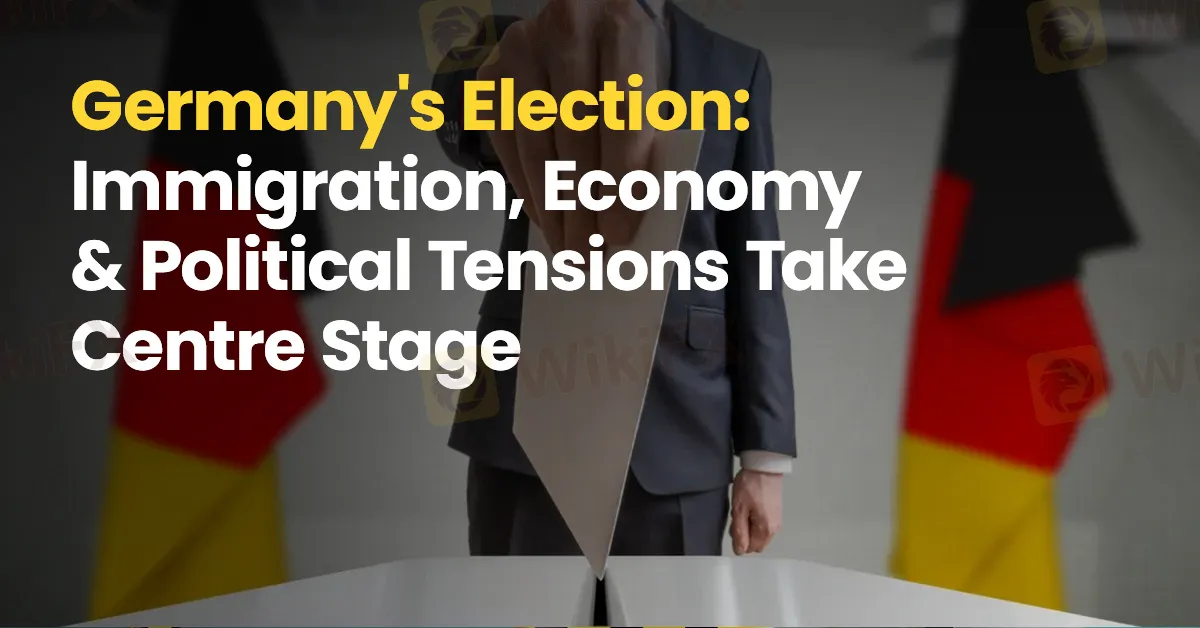Germany's Election: Immigration, Economy & Political Tensions Take Centre Stage
Abstract:Germany is set to hold a crucial general election on 23 February 2025, with voter frustration over migration emerging as a dominant issue.

Germany is set to hold a crucial general election on 23 February 2025, with voter frustration over migration emerging as a dominant issue. The centre-right Christian Democrats (CDU) currently lead the polls with approximately 29% support, positioning party leader Friedrich Merz as the frontrunner to succeed Chancellor Olaf Scholz. Meanwhile, the far-right Alternative for Germany (AfD), a party under scrutiny by domestic intelligence services for suspected extremist ties, has gained significant traction, securing 21% of voter support.
AfD's rise has been largely driven by its firm stance on migration policies. The party argues that the German government has failed to differentiate between asylum seekers and economic migrants, leading to what it describes as a decade-long influx of illegal migration. Political analysts note that AfD's increasing support correlates with its radicalisation, resonating with sections of the electorate that favour stricter immigration controls. Additionally, the party has taken a strong stance against Germanys environmental transformation policies and maintains a pro-Russian position, opposing military aid to Ukraine.
The partys policies have drawn international attention, including an endorsement from billionaire entrepreneur Elon Musk, who claimed that AfD was the only party capable of “saving Germany.” Musk further criticised attempts to label the party as extremist, pointing to the background of AfD co-leader Alice Weidel, who has a same-sex partner from Sri Lanka. His comments, published in a German newspaper, sparked further debate, and he later hosted a live discussion with Weidel on his social media platform.

Recent terrorist attacks in Germany have intensified national debates on migration, shifting electoral discussions away from previous campaign priorities such as climate change. Experts note that the heightened focus on immigration marks a stark contrast to the 2021 election, where environmental policies took centre stage.
Despite its growing support, AfD continues to face significant opposition from many Germans. Widespread protests have taken place in cities such as Berlin, where demonstrators rallied against the partys far-right ideology.

While migration remains a focal point of the campaign, the cost-of-living crisis remains a major concern for voters. Germany, Europe‘s largest economy, continues to grapple with inflation, worsened by its previous dependence on inexpensive Russian energy. The country’s automotive sector faces mounting pressure from Chinese competitors, while potential U.S. import tariffs and demands for increased defence spending add to economic uncertainty.
These pressures contributed to the collapse of the three-party coalition government in November. Chancellor Scholz has proposed increasing borrowing to address a €24 billion budget shortfall and fund military aid for Ukraine. However, Merz and the CDU argue against further debt accumulation, advocating instead for policies aimed at stimulating economic growth.

Although the CDU is expected to win the election, polls suggest it will fall short of an outright majority. Merz has ruled out forming a coalition with AfD, despite previously relying on the partys support for parliamentary motions on immigration policy. The so-called “firewall” policy, a post-World War II strategy aimed at excluding far-right parties from governance, remains a central feature of German politics.
Internationally, this approach has drawn criticism, notably from U.S. Vice President JD Vance, who, in a speech at the Munich Security Conference, warned against excluding political groups from democratic processes. His remarks, followed by a meeting with Weidel, were met with bipartisan rejection from mainstream German politicians. Chancellor Scholz condemned what he described as “American interference” in Germanys democratic processes, while Merz voiced concerns over U.S. encroachments on European politics.

Read more

Prop Trading Firms vs. CFD Brokers: Who’s Winning the Retail Trading Race?
In recent years, a new breed of retailer-focused trading firms has emerged: proprietary (prop) trading outfits that recruit individual traders to trade the firm’s capital under structured rules. Boasting low entry costs, clear risk parameters, and profit-sharing incentives, these prop firms are rapidly winning over retail traders, many of whom previously traded Contracts for Difference (CFDs) with established online brokers. As prop trading revenues accelerate, a key question arises: Are CFD brokers losing business to prop firms?

Shocking Move: Yen Breaks Past 140 Barrier!
The yen's breakout above the 140 mark has caught global attention, and the reasons behind it are more than technical.

Another ‘Tan Sri’ Targeted, RM347 Million in Assets Seized in MBI Scam
Malaysia’s police are stepping up their investigation into the MBI investment scam, a multi-billion ringgit fraud that has dragged on for nearly a decade. The Royal Malaysian Police (PDRM) is now planning to arrest another prominent figure with the title ‘Tan Sri’, following recent arrests and major asset seizures.

FINRA fines SpeedRoute for alleged rule violations
The Financial Industry Regulatory Authority (FINRA) has imposed a $300,000 fine on SpeedRoute LLC for a series of supervisory, risk management, and anti-money laundering (AML) program deficiencies spanning from 2017 to the present. Of this amount, $75,000 is payable to FINRA, with the remainder offset by SpeedRoute’s limited ability to pay. In addition to the monetary penalty, SpeedRoute has been censured and ordered to overhaul its compliance framework, including enhancing its written supervisory procedures (WSPs) for market access controls and strengthening its AML program.
WikiFX Broker
Latest News
Coinbase Eyes U.S. Federal Bank Charter for Crypto Growth
Why People Fall for Online Trading Scams
Germany’s April PMI Falls Below 50 as Service Sector Stumbles
PayPal Opens Regional Hub in Dubai, Expands Middle East Reach
FINRA fines SpeedRoute for alleged rule violations
RM15,000 Profit Turned into RM1.1 Million Loss for Engineer!
New to FX Trading? Stop! Read These Warnings First
Prop Trading Firms vs. CFD Brokers: Who’s Winning the Retail Trading Race?
TRADE.com UK Sold to NAGA Group Amid 2024 Revenue Drop
World Trading Tournament (WTT): The Game-Changer in Global Trading
Rate Calc
